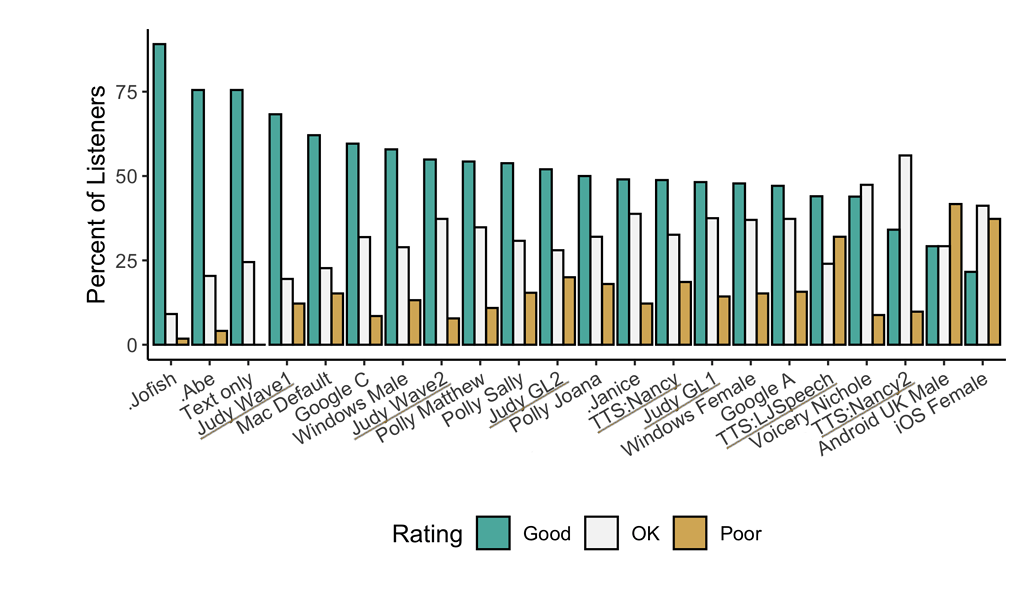📣 Clone your voice with a single click on 🐸Coqui.ai
📣 🐸Coqui Studio is launching soon!! Join our waiting list!!
🐸TTS is a library for advanced Text-to-Speech generation. It's built on the latest research, was designed to achieve the best trade-off among ease-of-training, speed and quality. 🐸TTS comes with pretrained models, tools for measuring dataset quality and already used in 20+ languages for products and research projects.
🚀 Sign up to free 🐸Coqui.ai API and start cloning your voice
📰 Subscribe to 🐸Coqui.ai Newsletter
📢 English Voice Samples and SoundCloud playlist
📄 Text-to-Speech paper collection
Please use our dedicated channels for questions and discussion. Help is much more valuable if it's shared publicly so that more people can benefit from it.
| Type | Platforms |
|---|---|
| 🚨 Bug Reports | GitHub Issue Tracker |
| 🎁 Feature Requests & Ideas | GitHub Issue Tracker |
| 👩💻 Usage Questions | Github Discussions |
| 🗯 General Discussion | Github Discussions or Gitter Room |
| Type | Links |
|---|---|
| 💼 Documentation | ReadTheDocs |
| 💾 Installation | TTS/README.md |
| 👩💻 Contributing | CONTRIBUTING.md |
| 📌 Road Map | Main Development Plans |
| 🚀 Released Models | TTS Releases and Experimental Models |
Underlined "TTS*" and "Judy*" are 🐸TTS models
- High-performance Deep Learning models for Text2Speech tasks.
- Text2Spec models (Tacotron, Tacotron2, Glow-TTS, SpeedySpeech).
- Speaker Encoder to compute speaker embeddings efficiently.
- Vocoder models (MelGAN, Multiband-MelGAN, GAN-TTS, ParallelWaveGAN, WaveGrad, WaveRNN)
- Fast and efficient model training.
- Detailed training logs on the terminal and Tensorboard.
- Support for Multi-speaker TTS.
- Efficient, flexible, lightweight but feature complete
Trainer API. - Released and ready-to-use models.
- Tools to curate Text2Speech datasets under
dataset_analysis. - Utilities to use and test your models.
- Modular (but not too much) code base enabling easy implementation of new ideas.
- Tacotron: paper
- Tacotron2: paper
- Glow-TTS: paper
- Speedy-Speech: paper
- Align-TTS: paper
- FastPitch: paper
- FastSpeech: paper
- SC-GlowTTS: paper
- Capacitron: paper
- Guided Attention: paper
- Forward Backward Decoding: paper
- Graves Attention: paper
- Double Decoder Consistency: blog
- Dynamic Convolutional Attention: paper
- Alignment Network: paper
- MelGAN: paper
- MultiBandMelGAN: paper
- ParallelWaveGAN: paper
- GAN-TTS discriminators: paper
- WaveRNN: origin
- WaveGrad: paper
- HiFiGAN: paper
- UnivNet: paper
You can also help us implement more models.
🐸TTS is tested on Ubuntu 18.04 with python >= 3.7, < 3.11..
If you are only interested in synthesizing speech with the released 🐸TTS models, installing from PyPI is the easiest option.
pip install TTSIf you plan to code or train models, clone 🐸TTS and install it locally.
git clone https://github.com/coqui-ai/TTS
pip install -e .[all,dev,notebooks] # Select the relevant extrasIf you are on Ubuntu (Debian), you can also run following commands for installation.
$ make system-deps # intended to be used on Ubuntu (Debian). Let us know if you have a different OS.
$ make installIf you are on Windows, 👑@GuyPaddock wrote installation instructions here.
-
List provided models:
$ tts --list_models -
Get model info (for both tts_models and vocoder_models):
-
Query by type/name: The model_info_by_name uses the name as it from the --list_models.
$ tts --model_info_by_name "<model_type>/<language>/<dataset>/<model_name>"For example:
$ tts --model_info_by_name tts_models/tr/common-voice/glow-tts$ tts --model_info_by_name vocoder_models/en/ljspeech/hifigan_v2 -
Query by type/idx: The model_query_idx uses the corresponding idx from --list_models.
$ tts --model_info_by_idx "<model_type>/<model_query_idx>"For example:
$ tts --model_info_by_idx tts_models/3
-
-
Run TTS with default models:
$ tts --text "Text for TTS" --out_path output/path/speech.wav -
Run a TTS model with its default vocoder model:
$ tts --text "Text for TTS" --model_name "<model_type>/<language>/<dataset>/<model_name>" --out_path output/path/speech.wavFor example:
$ tts --text "Text for TTS" --model_name "tts_models/en/ljspeech/glow-tts" --out_path output/path/speech.wav -
Run with specific TTS and vocoder models from the list:
$ tts --text "Text for TTS" --model_name "<model_type>/<language>/<dataset>/<model_name>" --vocoder_name "<model_type>/<language>/<dataset>/<model_name>" --out_path output/path/speech.wavFor example:
$ tts --text "Text for TTS" --model_name "tts_models/en/ljspeech/glow-tts" --vocoder_name "vocoder_models/en/ljspeech/univnet" --out_path output/path/speech.wav -
Run your own TTS model (Using Griffin-Lim Vocoder):
$ tts --text "Text for TTS" --model_path path/to/model.pth --config_path path/to/config.json --out_path output/path/speech.wav -
Run your own TTS and Vocoder models:
$ tts --text "Text for TTS" --model_path path/to/config.json --config_path path/to/model.pth --out_path output/path/speech.wav --vocoder_path path/to/vocoder.pth --vocoder_config_path path/to/vocoder_config.json
-
List the available speakers and choose as <speaker_id> among them:
$ tts --model_name "<language>/<dataset>/<model_name>" --list_speaker_idxs -
Run the multi-speaker TTS model with the target speaker ID:
$ tts --text "Text for TTS." --out_path output/path/speech.wav --model_name "<language>/<dataset>/<model_name>" --speaker_idx <speaker_id> -
Run your own multi-speaker TTS model:
$ tts --text "Text for TTS" --out_path output/path/speech.wav --model_path path/to/config.json --config_path path/to/model.pth --speakers_file_path path/to/speaker.json --speaker_idx <speaker_id>
|- notebooks/ (Jupyter Notebooks for model evaluation, parameter selection and data analysis.)
|- utils/ (common utilities.)
|- TTS
|- bin/ (folder for all the executables.)
|- train*.py (train your target model.)
|- ...
|- tts/ (text to speech models)
|- layers/ (model layer definitions)
|- models/ (model definitions)
|- utils/ (model specific utilities.)
|- speaker_encoder/ (Speaker Encoder models.)
|- (same)
|- vocoder/ (Vocoder models.)
|- (same)



